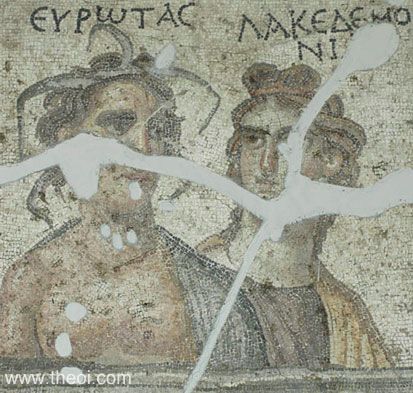EUROTAS
Greek Name
Ευρωτας
Transliteration
Eurôtas
Latin Spelling
Eurotas
Translation
River Eurotas

EUROTAS was a river-god of Lakedaimonia (Lacedaemonia) in the Peloponnese, southern Greece. He was an early king of the region and possessed a mortal, rather than typical river-god, genealogy.
The River Eurotas had its headwaters in the Taygetos Mountains and flowed south through the heart of Lakonia, past the city of Sparta, to reach the Mediterranean Sea near Helos on the Lakonian Gulf. The most important neighbouring rivers personified by the Greeks were the Inakhos (Inachus) of Argos to the north-east and the Alpheios (Alpheus) of Arkadia and Elis to the north-west.
PARENTS
[1.1] LELEX & KLEOKHAREIA (Apollodorus 3.116)
[2.1] MYLES (Pausanias 3.1.2)
OFFSPRING
[1.1] PITANE (Pindar Olympian 6)
[2.1] SPARTE (Apollodorus 3.116)
[2.2] SPARTE, TIASA (Pausanias 3.18.6 & 8.25.2)
[3.1] Perhaps BATEIA, PERIBOIA, THERO
ENCYCLOPEDIA
EURO′TAS (Eurôtas), a son of Myles and grandson of Lelex. He was the father of Sparte, the wife of Lacedaemon, and is said to have carried the waters, stagnating in the plain of Lacedaemon, into the sea by means of a canal, and to have called the river which arose therefrom after his own name, Eurotas. (Paus. iii. 1. § 2.) Apollodorus (iii. 10. § 3) calls him a son of Lelex by the nymph Cleochareia, and in Stephanus of Byzantium (s. v. Taügeton) his mother is called Taygete. (Comp. Schol. ad Pind. Pyth. iv. 15, Ol. vi. 46, ad Lycoph. 886.)
Source: Dictionary of Greek and Roman Biography and Mythology.
CLASSICAL LITERATURE QUOTES
Pindar, Olympian Ode 6. 28 ff (trans. Conway) (Greek lyric C5th B.C.) :
"Beside Eurotas' stream, to journey to Pitane. She, so they tell, was loved of great Poseidon, son of Kronos (Cronus), and bore the babe Euadne (Evadne)."
Pseudo-Apollodorus, Bibliotheca 3. 116 (trans. Aldrich) (Greek mythographer C2nd A.D.) :
"Lakedaimon (Lacedaemon) and Sparte (Sparta), a daughter of Eurotas, a son of autochthonous Lelex and a Naias Nymphe (Naiad Nymph) named Kleokhareia (Cleocharia)."
Strabo, Geography 8. 5. 3 (trans. Jones) (Greek geographer C1st B.C. to C1st A.D.) :
"And Sophokles says, ‘by the two Lapersai [i.e. the Dioskouroi (Dioscuri)], I swear, by Eurotas third, by the gods in Argos and about Sparta.’"
Pausanias, Description of Greece 3. 1. 2 (trans. Jones) (Greek travelogue C2nd A.D.) :
"On the death of Myles his son Eurotas succeeded to the throne. He led down to the sea by means of a trench the stagnant water on the plain, and when it had flowed away, as what was left formed a river-stream, he named it Eurotas (Fair-flowing)."
Pausanias, Description of Greece 3. 1. 2 :
"Lakedaimon (Lacedaemon) was wedded to Sparta, a daughter of Eurotas."
Pausanias, Description of Greece 3. 18. 6 :
"[There is in Lakedaimonia a] river called Tiasa. They hold that Tiasa was a daughter of Eurotas."
Aelian, Historical Miscellany 2. 33 (trans. Wilson) (Greek rhetorician C2nd to 3rd A.D.) :
"The nature of rivers, and their streams, are visible to us. But men who honour them, and have statues made of them, in some cases set up anthropomorphic statues, while others give them bovine form. A likeness to cattle is attributed . . . by the Spartans to the Eurotas."
SOURCES
GREEK
- Pindar, Odes - Greek Lyric C5th B.C.
- Apollodorus, The Library - Greek Mythography C2nd A.D.
- Strabo, Geography - Greek Geography C1st B.C. - C1st A.D.
- Pausanias, Description of Greece - Greek Travelogue C2nd A.D.
- Aelian, Historical Miscellany - Greek Rhetoric C2nd - 3rd A.D.
BIBLIOGRAPHY
A complete bibliography of the translations quoted on this page.